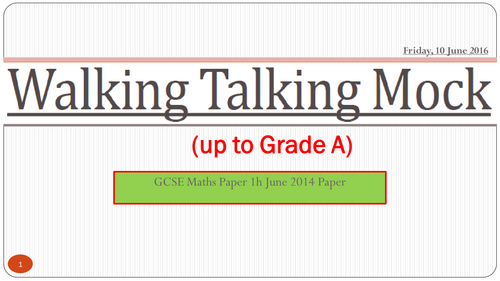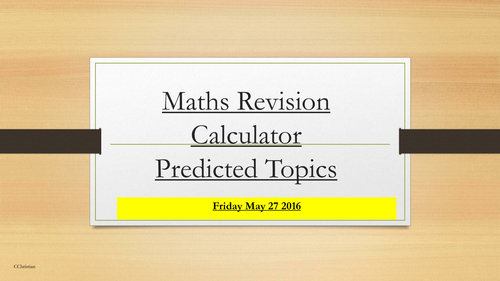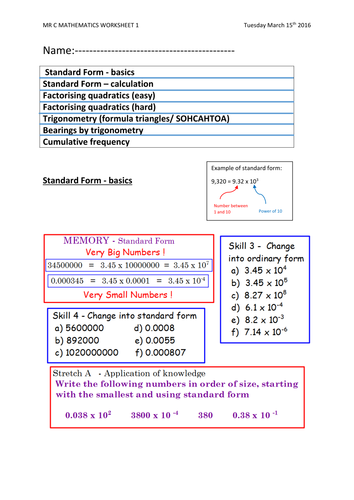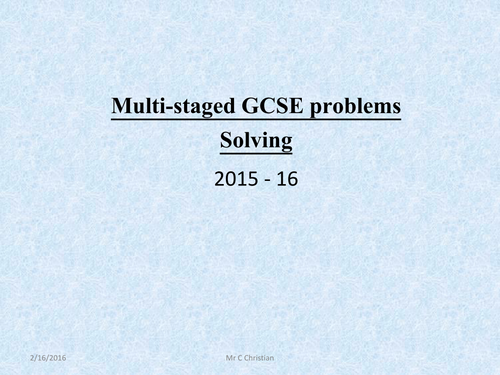50Uploads
103k+Views
121k+Downloads
All resources

Practice questions to stretch your ability.
This resource will help to analyse closely the weaknesses in student’s knowledge and to put strategies in place to help them before the summer exams.

GCSE Maths Predicted Paper 3 with unseen questions
UNSEEN Paper 3 topics :
Cosine Rule
Sine Rule
Iteration
Transformation (Enlargement)
Transforming trig graphs
Quadratic/Cubic graphs
Area of non- right-angle triangle
Bounds/Limits
Histogram
Proof (Geometry)
Compound measures (Pressure, Speed distance and time, Density, volume and mass)
Equation of a circle
Loci/construction/Bearings
LCM/HCF
Volume of a cone/sphere
Frequency Polygons
Laws of Indices
Simultaneous Equations
Use of Calculator/reciprocal
Compound
Simultaneous Equations (non-linear)
Congruent Triangles
Conditional Probability
Circle Theorems Proofs
Recurring Decimals to Fractions
Quadratic inequalities/graphs
Quadratic sequence nth term
Quadratic Formula
Venn Diagrams
Capture Recapture
Estimated Mean
Reverse Percentages
Similar shapes
Scatter graphs
Comparing Box Plot
Shaded Area
Similar Shapes
Polygon/Angles

Final GCSE Maths Predicted paper 2 for 2019
For consolidation and preparation for the 2019 GCSE Maths paper 2 Exam

Final Predicted paper 1h 2019
This maths GCSE predicted paper covers the fundamentals required on the paper 1. The practice paper will encourage the pupils to work through independently and are visually engaging to appeal to the students. Each questions should take approximately 2-4 minutes to complete. The resource pack can be use for revision in preparation for the upcoming GCSE exams. Easy to mark, with students friendly mark scheme

Gcse maths predicted papers 2019
To work on improving subject knowledge in key areas
To identify common areas of misconception
To share common areas that students lose marks
To reinforce understanding of previous taught lessons.
To build confidence through consolidation.

To prepare students for the upcomimg GCSE Maths Paper 1H
To Practice a specific topic with Topic Busters,
Preparation for the exam with a Prediction of what the paper could look like,
Challenge students against a Demon Paper in may

4-A-DAY GCSE MATHS QUESTIONS
To build confidence for the examination
To identify common areas of misconception
To work on improving subject knowledge in key areas
To build confidence through consolidation.

Hit the target
To build confidence for the examination
To identify common areas of misconception
To work on improving subject knowledge in key areas
To build confidence through consolidation.

2019 GCSE Maths Predicted Paper 1
To build confidence for the examination
To identify common areas of misconception
To work on improving subject knowledge in key areas
To build confidence through consolidation.

June 2018 Maths crossover questions. This will help both the higher and the foundation students.
Help to reinforce key examination skills.
Step by step explanation on the crossover for June 2018 paper
WTM - Paper and power point which can be printed for all students to use.
Excellent resource for middle set.

Revision powerpoint to help students understand GCSE type questions
Each question is indicated as calculator or non-calculator and has the relevant grading. Final column allows pupil self-assessment of the topic and question.
The idea is to place knowledge of what is required to achieve the highest grades in the hands of the student.

Examination Warm-up
There are three advantages of a warm-up session:
It allows you to remind them of all those vital little tricks that they ALWAYS forget.
It ‘gets their minds working’ - and working, moreover, about History.
It creates a corps d’esprit, and psyches them up for the exam.
Can be used for all year 9-11 maths groups to get them ready for their examination.
For set 1-3 mostly, due to the difficulty level of the questions

Gcse problem solving
The aim of this resource is to enable students and teachers to:
•recognize that mathematics permeates the world around us
•appreciate the usefulness, power and beauty of mathematics
•enjoy mathematics and develop patience and persistence when solving problems
•develop mathematical curiosity and use inductive and deductive reasoning when solving problems
•become confident in using mathematics to analyse and solve problems both in school and in real-life situations
•develop the knowledge, skills and attitudes necessary to pursue further studies in mathematics
•develop abstract, logical and critical thinking and the ability to reflect critically upon their work and the work of others

WTM
A Walking Talking Mock on the June 2014 paper. Print the paper and use the powerpoint to walk students through the paper. The aim of this exercise is to:
(1) To build confidence for the examination in May or June
(2) To work on improving subject knowledge in key areas
(3) To identify common areas of misconception
(4) To share common areas that students lose marks
After walking the students through the paper, print the same paper for the students to complete under examination condition. Students are expected to make significant progress.

Gcse Maths Calculator Paper Revision 2016
Set of past examination questions with maths watch clip numbers to help students with their preparation for the June 2016.

Worksheet on key maths areas.
This worksheet will help students to structure their revision focusing on key areas.

Multi-stage Problem solving
To build students’ confidence and resilience to tackle multi-staged GCSE questions
To promote and develop strategies for answering multi-staged GCSE questions
To promote independent thinking skills
How to use the materials:
Each problem can be used as 10 min starter activity
Show the problem and give students 5 minutes to work on their own
Reveal any prompts as appropriate
Discuss solutions and model thinking and strategies used to obtain correct answers (5 mins)
Use the problems on a regular basis between now and June




















